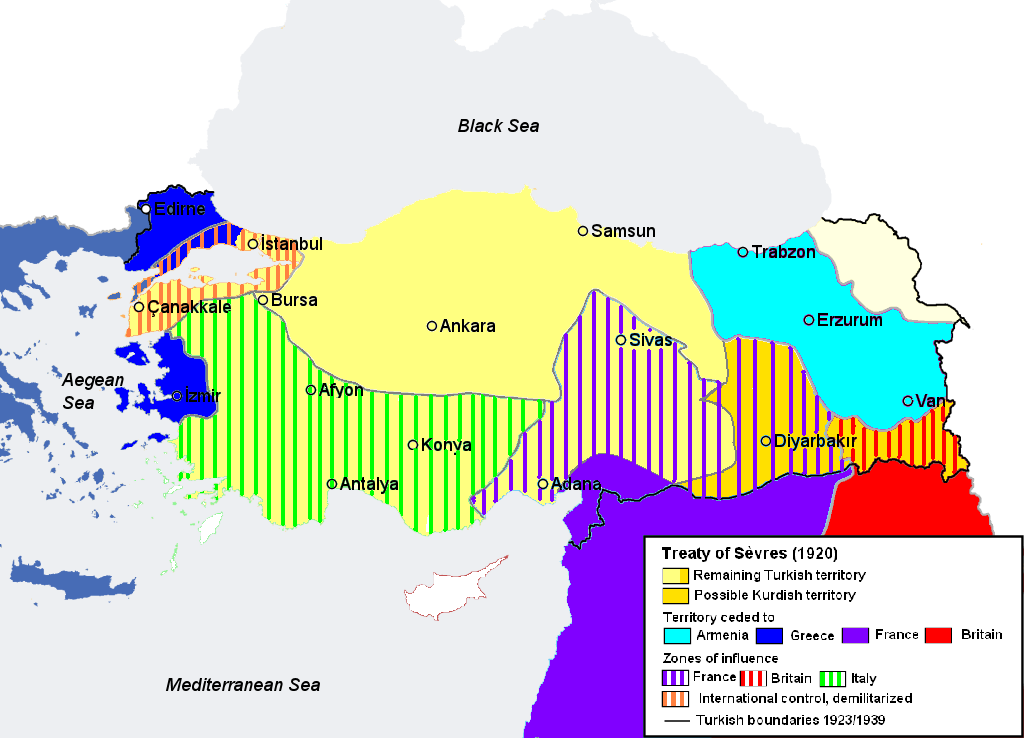Turkey is not the Ottoman Empire
The Ottoman Empire lost the First World War and was forced to sign the Treaty of Sèvres which sanctioned the partition of the empire. The treaty contained strong punitive measures, ironically, also because the Ottoman Empire perfomed better than expected. In fact it gained a strong victory at the Battle of Gallipoli. So it was in part a measure of revenge.

(source: wikimedia.org)
As you can see very little land was left to the Turks and, more importantly, everybody else, including the other people of the former empire were given something. Point one: everybody is against the Turks.
The treaty was never put in pratice because the Turkish nationalist movement, led by Ataturk, won the Turkish War of Independence against the western proxies (mainly Greece) and also what remained of the Ottoman Empire. Instead it was signed the Treaty of Lausanne which said that the western powers would have kept all the rest of the Ottoman Empire land but Turkey would have kept all Turkish lands. So, nothing would have gone to Greece, Armenia or the Kurds. The losers were obviously not happy, and especially the Kurds which did not have any land elsewhere.
Point two: the Turks are surrounded by enemies. And also Point three: Turkey is not simply repressing the Kurds, Turkish and Kurdish people are continuing a conflict started by the fall of the Ottoman Empire.
Turkey is a modern state
Ataturk, the father of Turkey, started a series of reforms to make Turkey a modern country similar to the western ones1. In particular is was inspired by France and their secularization. A crucial component of this process is a national education that create a national identity to form a nation. Did I say nation? This imply, if not to overtly suppress minorities, at the very least to suppress and diminish their culture. As others have mentioned everybody did it, Turkey is simply doing it in the wrong century or is doing it for too short of a time, depending on how you look.
Multiethnic empires did not need to have a uniform culture, because only the king and/or nobility mattered, people had no power. But in modern countries they matter, political and personal identities are important, even in multinational states. Kurdish identity was competing with the Turkish identity and as such was an obstacle to become a modern country. This answers the first question: the Ottoman Empire did not care about their people, while Turkey is their people.
Point four: a common identity is a need for a modern nation.
It should also be noted that while Turkey attempted to imitate France, the strong secularization was very controversial and it still is. This and other things led to many periods of martial law, Coup d'état and the like. Again poltiical turmoil is not surprising in modernizations, it happened everywhere. But the fact this has occured in recent times helps to understand why Turkey might still be in the very nationalistic phase of modernity.
The answer to the question why the Turks did not want the lose part of their territory by granting independence to the Kurds is in part self-evident. In the sense that nobody want to be weak, and in part connected to point 1 and 2. They would not only lose territory but they feel they would gain a new enemy.
Today and the future
You might think that this answers the question of why they acted this way in the past, but not today, because this is a different time. Many modern countries have stopped repressing minorities. To understand this, you have to remember that history matters to politics and identity. Everybody else in the region is still quite aggressive, for instance see the bizarre Macedonian naming dispute started by Greece.
Furthermore the Kurds are also influenced by the situation on the ground. Many people, including obviously the Kurds, talk about Kurdistan as if it were one thing. In reality there are strong political and organizational differences between the Kurds living in different countries, they all have their own parties and militias.
The change of attitude toward minorities works both ways, the Kurds do not need Kurdistan to survive and mantaining their own identity. This lead to a complex game: let's say you would give Kurds independence, if the alternative is a civil war, but if you just wait a few years there might not be a civil war. So what do you do? A little repression, to lessen the Kurdish identity, but not too much, to avoid a civil war? It's hard for both government and people to decide what to do.
However the situation actually improved and it seemed we were close to peace: Solution process. But history bit again and the Syrian Civil War led to a new period of conflict. So, depending on how this evolve, the peace process could continue and Kurds in Turkey could have better times, but we have to wait and see.
1 The first version of the paragraph was mixed-up. Thanks to bregalad for pointing it out.
